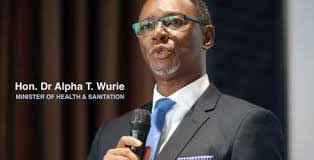By Fatmata Jengbe
In fulfilment of its obligation, Sierra Leone has completed its 2019 self-evaluation to determine the country’s health security capacities as required by the International Health Regulations (IHR 2005). A comprehensive multi-sectoral approach was used to fill the mandatory IHR State Party Self-Assessment Annual Reporting (SPAR) tool. The SPAR obliges countries to report annually to the World Health Assembly on their progress and compliance with implementation of the IHR requirements.
The Ministry of Health and Sanitation conducted the exercise in Freetown in collaboration with its one health sector partners from agriculture, national security and the environment for an holistic approach to health using set international standards and tools. In addition, the country also conducted a Joint External Evaluation (JEE) Self-Assessment Score card 2019 to track the JEE indicators.
Sierra Leone was the first country in the African region to initiate this innovative approach in 2018. Implementation of the IHR calls for countries to develop and strengthen specific national public health capacities, identify priority areas for action, develop national IHR implementation plans, maintain and institutionalize such capacities for progressive improvement over time.
WHO plays the coordinating role in IHR and, in collaboration with its partners, helps countries to build capacities through training, development of tools and guidelines. “The self-evaluation is both domestic and international obligations and we are pleased to be supporting Sierra Leone in fulfilling these requirements,” says Evans Liyosi, WHO Country Representative in Sierra Leone. “This country has made considerable progress in the IHR implementation process by improving capacities in surveillance through training of key personnel and establishment of coordination platforms such as the one health programme and has developed a National Action Plan for Health Security which are some of the bench marks of progress.”
About IHR
The IHR represents an agreement among 196 countries including all Member States of the World Health Organization (WHO) to collaborate transparently and with mutual accountability in enhancing global health security through timely information sharing on public health events.
Some of the measures under the IHR include effective surveillance activities at ports, airports and ground crossing points to limit the spread of health risks and diseases across borders, and to prevent unwarranted travel and restrictions on economic activities between and among countries.
Outcome of the self-assessment
Findings of the evaluation process have been submitted to WHO IHR secretariat as the country’s IHR annual report for 2019 using the electronic version of SPAR (eSPAR). The eSPAR is being used for the first time by Member States as the new means through which to submit their report.
“In order to make significant progress in the implementation of the National Action Plan for Health Security (NAPHS), WHO and other partners have supported the country to establish an accountability framework which seeks to strengthen technical leadership and ownership through the appointment of JEE-NAPHS technical area leads, capacity building and developed of Terms of Reference” says Dr Charles Njuguna ,WHO Health Security and Emergency Lead in Sierra Leone.
The use of the JEE tool to assess the progress indicators has enabled the Sierra Leone to compare the 2018 and 2019 results. Hence, the process of identifying high priority activities for NAPHS 2020 operational plan was initiated by the multisector partners during the deliberations. A quarterly monitoring check-in process will be used to monitor progress in the implementation of priority activities in the NAPHS 2020 operational plan that has been developed.
The Korea International Cooperation Agency (KOICA) has been very instrumental in supporting the work of health security in five selected countries including Sierra Leone through the World Health Organization.




